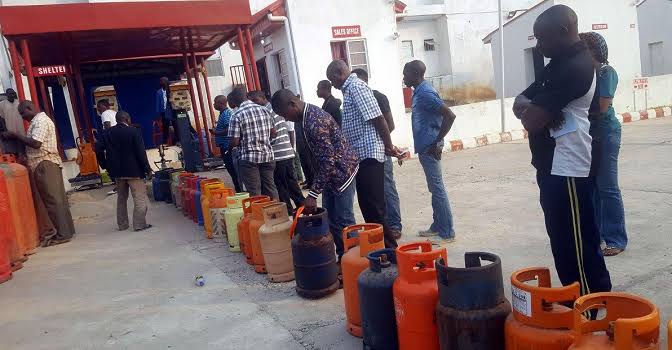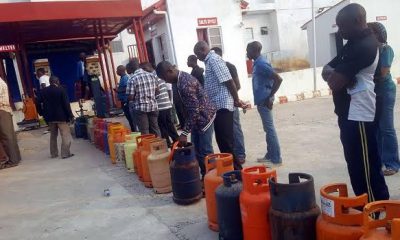Business
Price Of Refilling Cooking Gas Per Kg In Nigeria

This week, Nigerians have reported some variations in the price of cooking gas across regions, with the cost averaging ₦1,300-₦1,400 per kilogram, depending on location.
Factors like international LPG prices, foreign exchange stability, and the festive season’s demand surge are the primary influences.
Efforts to boost domestic LPG production and streamline import processes may help stabilize prices in the long run, but consumers should be prepared for short-term fluctuations influenced by global and local economic conditions.
The price of cooking gas in Nigeria this week is influenced by several key factors, which include:
1. Global Crude Oil Prices
The price of Liquefied Petroleum Gas (LPG), commonly called cooking gas, is tied to global crude oil prices. Any fluctuations in the international oil market directly affect the cost of LPG imports, as Nigeria relies heavily on imported LPG.
2. Foreign Exchange Rates
The exchange rate between the Nigerian Naira and the US Dollar significantly impacts the price of cooking gas. Since LPG imports are paid for in foreign currency, a weaker Naira results in higher import costs, which are passed on to consumers.
3. Domestic Supply and Importation
Nigeria produces LPG domestically, but supply shortages often result in a reliance on imports to meet demand. If domestic production increases or imports are streamlined, prices may stabilize. Conversely, disruptions in supply chains or import challenges can cause price spikes.
4. Transportation and Logistics Costs
The cost of transporting LPG from production or importation hubs to distribution centers and retailers affects its final price. High transportation costs, often driven by petrol and diesel prices, contribute to price fluctuations.
5. Seasonal Demand
Demand for cooking gas typically rises during festive seasons like Christmas, as households prepare for celebrations. This increased demand can lead to temporary price increases.
6. Inflation and Economic Policies
General inflation in the economy affects the cost of all goods and services, including LPG. Additionally, government policies or interventions, such as subsidies or import duties on LPG, can influence prices.
7. Supply Chain Efficiency
Delays in supply chains, including distribution challenges or inefficiencies at import terminals, can lead to shortages and higher prices.
8. Market Dynamics
Competition among LPG marketers and distributors plays a role in determining retail prices. In areas with limited competition, prices are often higher.
9. Government Regulations
Policies regarding subsidies, taxation, and import tariffs directly influence the price of LPG. Recent regulatory interventions to encourage domestic production or reduce import reliance could affect pricing.
10. Storage and Handling Costs
The costs incurred by retailers for storing and handling LPG are factored into the retail price. Increases in operational costs for businesses can lead to higher prices for consumers.
See the price of cooking gas per kg below:
1kg Cooking gas – ₦1,300
3kg Cooking gas – ₦3,900
5kg Cooking gas – ₦6,500
6kg Cooking gas – ₦7,800
10kg Cooking gas – ₦13,000
12.5kg Cooking gas – ₦16,250


